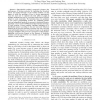Free Online Productivity Tools
i2Speak
i2Symbol
i2OCR
iTex2Img
iWeb2Print
iWeb2Shot
i2Type
iPdf2Split
iPdf2Merge
i2Bopomofo
i2Arabic
i2Style
i2Image
i2PDF
iLatex2Rtf
Sci2ools
135
click to vote
INFOCOM
2011
IEEE
2011
IEEE
Consort: Node-Constrained Opportunistic Routing in wireless mesh networks
— Opportunistic routing is proposed to improve the performance of wireless networks by exploiting the broadcast nature and spatial diversity of the wireless medium. In this paper, we study the problems of how to choose opportunistic route for each user to optimize the total utility or profit of multiple simultaneous users in a wireless mesh network (WMN) subject to node constraints. We formulate these two problems as two convex programming systems. By combining primaldual and subgradient methods, we present a distributed iterative algorithm Consort (node-CONStrained Opportunistic RouTing). In each iteration, Consort updates Lagrange multipliers in a distributed manner according to the user and node behaviors obtained in the previous iteration, and then each user and each node individually adjusts its own behavior based on the updated Lagrange multipliers. We prove the convergence of this iterative algorithm, and provide bounds on the amount of feasibility violation and the gap betwe...
Related Content
| Added | 21 Aug 2011 |
| Updated | 21 Aug 2011 |
| Type | Journal |
| Year | 2011 |
| Where | INFOCOM |
| Authors | Xi Fang, Dejun Yang, Guoliang Xue |
Comments (0)

